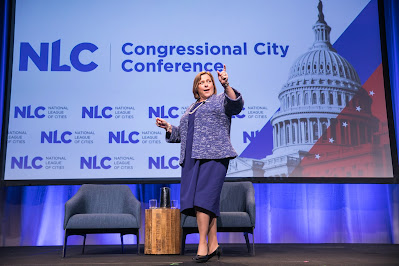Kathy Maness speaks at the Congressional City Conference as the NLC president.
Since March of 2020, a multitude of crises have converged on municipalities including weather disasters, the economic downturn and of course, the COVID-19 pandemic.
As a councilwoman from Lexington, I know just how challenging it can be to tackle these issues in my community and I was glad for the state and national support we received from the Municipal Association of SC and the National League of Cities.
NLC is the nation’s oldest and largest advocacy organization, serving as the voice of America’s cities, towns and villages, representing more than 200 million people across the country.
In November 2020, I was elected as the first person from South Carolina to serve as president of the National League of Cities. During this year, the COVID-19 pandemic turned our world upside down.
And as President, I made sure that NLC worked hand-in-hand with the Municipal Association of SC and other municipal leagues across the country to help our cities and towns respond, recover and rebuild from the impact of the pandemic.
Immediately following NLC’s Congressional City Conference in March 2020, stay-at-home orders were issued across the country.
Throughout the pandemic, municipal leaders took action for their residents and continued the important work of running our communities. In Lexington, we stablished a $1 million loan program to aid in-town businesses impacted during the COVID-19 pandemic. We also provided a rebate program aimed at investing $250,000 back into small businesses in 30 days.
From helping small businesses, supporting food banks and giving critical support to residents, the work and leadership of local officials from across the nation and especially in South Carolina were critical in keeping our residents moving forward – but we couldn’t do it alone.
I am so proud of all the work that the National League of Cities, in close partnership with state municipal leagues such as Municipal Association of SC, did to support local leaders and ensure federal relief for our communities during my year as president. It took more than a year of lobbying and making our case that Cities Are Essential to the media, but, in the end, we delivered for municipalities in South Carolina and across the country.
In March of 2021, American Rescue Plan Act delivered $65.1 billion dollars in federal relief to cities, towns and villages across America. More than $620 million went directly to municipalities in South Carolina.
Last month, the BIPARTISAN infrastructure bill was passed marking an important turning point for our nation’s infrastructure, with historic investments supporting South Carolina communities rebuild with more than $6 billion for much needed improvements to our roads, bridges, water and broadband.
That past year has been truly challenging and it has taught us that we all will always have both new and old issues to address. However, I’m grateful it has also shown us all we can accomplish together and that we are never alone in facing the obstacles ahead.

